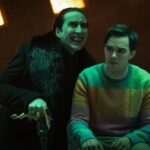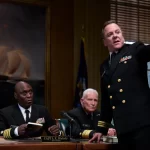A Series of Crimes: Angels with Dirty Faces, by Aaron Pinkston
The western may be the “American genre,” the story of this country’s humble beginnings, but the gangster film was and always will be what America ultimately became. Still in the grips of economic depression, the gangster films of the early 1930s dealt with these issues head-on, creating champions of the working poor who “made it” through bootlegging and racketeering and any other sort of organized crime activity. I mentioned in my discussion of Bring Me the Head of Alfredo Garcia that the crime films of the 1970s worked with an ambivalence of the American dream — the earlier gangster films were all about the American dream, perhaps by skewed means, but by any means necessary. With its views on our capitalistic economic system, even these early gangster films are still relevant today.
Released after the first wave of popular American gangster films (and after the Hays code took effect), Angels with Dirty Faces is a film about crime in the American city. The very first shot of the film establishes this well: a long pan over a vibrant city corner, full of working class people in a communal environment. As most gangster flicks (being steeped in the American dream) are about individualism rewarded, Angels with Dirty Faces is more about community, at least about how the individualistic winner influences the community, grooms the next generation. It is also about a central friendship. Rocky (James Cagney) and Jerry (Pat O’Brien) grew up together, got into trouble together, and, even as they grew apart to represent two different poles of society, needed each other.
The film shows the thin line between a priest and a criminal — when young Rocky and Jerry attempt to knock off a train transporting fountain pens, Rocky is caught and sent to reform school while Jerry escapes. In turn, Rocky becomes trapped in a life of crime and Jerry takes advantage of this second chance and becomes a priest. This is another brilliant articulation of the idea that anyone can become a criminal if the circumstances are right. Rocky first turns to thievery because it is his only choice, saying “What we don’t take we ain’t got,” and is forever then trapped by the system. And from the very same hood, Father Jerry understands these implications and you can see it battling within him in every action. He truly loves Rocky, even as he fights what Rocky has become, he holds hope that his friend can change — they share a history and societal DNA, so surely there is some good in him. This dynamic is what makes the central relationship in Angels with Dirty Faces so compelling.
Rocky’s other major relationship in the film is with a group of children who are coming to the same crossroads crossed by Rocky and Jerry. Despite Father Jerry’s best intentions and attention, the neighborhood kids all idolize Rocky, not necessarily because he is a gangster but because of what the gangster represents. Unlike Father Jerry, Rocky is cool, self-confident, successful and full of real life experience — on paper, everything a role model should be. Even though he is a criminal, Rocky teaches the kids a number of valuable lessons on what it takes to be a man.
Really, Rocky is the gangster with a heart of gold. Rocky doesn’t make the ultimate mistake that dooms many cinematic gangsters- he isn’t looking for more power than he can handle. Though he is willing to commit crimes, even kill, to make money, he is only willing to take what he deserves, only asking for the cut he agreed upon with his lawyer (played by Humphrey Bogart in one of his last roles before becoming a star) in exchange for being the fall guy. He is also very giving, sharing his money with the neighborhood kids, giving a well-paying job to his gal and anonymously donating ten grand to Father Jerry to build a new recreation center for the community. All in all, he seems like a pretty swell guy. A criminal deviant, sure, but a stand-up one. Even Rocky’s blaze of glory isn’t sparked by a score or self-preservation, but by protecting a friend. As a character muses late in the film, Rocky isn’t a bad guy, it was the system that made him a criminal.
Still, being a gangster film, especially during the height of the production code, there must be a balance. The production code may actually have a lot to do with Rocky being so obviously likable — though it seems counter-intuitive to make a criminal that you don’t want your audience to really connect with (the essence of the crime film), if you look particularly at Cagney’s pre-code gangster film The Public Enemy, you’ll see essentially the same character as much more antagonistic, an anti-social deviant. By the end of the film, it is imperative that Father Jerry deliver the grand speech wondering why kids today idolize gangsters instead of the hard working businessman. We need both influences for either to exist. As the kids start hanging around pool halls instead of the community center, they’ve gone too far and must be brought back to the middle. Being tough, self-reliant and having fun is well and good, but not at the expense of living a moral life. They can learn from the gangster as long as they ultimately listen to the Father (ironically, none of the kids seem to have actual fathers in this film).
This comes to fruition in the film’s brilliant final scene, where Rocky is put to death. When Father Jerry pleads with Rocky to pretend he is scared to die for the sake of the children, the gangster refuses to crack. As Rocky approaches the electric chair (and the camera) a steely grin comes across his face. But then the shot cuts away and we hear Rocky’s cowardly pleas. It is fascinating to me how this scene is staged — why not show Rocky “going yellow” if that is what the film is trying to sell? It is one of the great tiptoes around the production code, a wonderful way to have it both ways.
It is impossible to talk about this film without talking about its star. James Cagney, undoubtedly a star, is a curious one — he’s not the manly man sort of icon that has become the norm for this type of role. Certainly he was cool, always quick-witted and sharp-tongued, with a fantastic snarl when he needed it. More importantly, he was authentic, not just a Hollywood projection of a working class urbanite, but a truthful one. It is strange to think of an actor so known for playing crooks as an everyman, but to me that is Cagney’s most obvious quality. Like the gangster, who worked hard from nothing to enjoy riches and power, Cagney seemed to defy the Hollywood norm in becoming a star. Male audiences throughout time can identify with Cagney just as the neighborhood kids identify with Rocky and that point comes through in every one of his performances.
































Well done! This is probably my favorite Cagney gangster film, and might even beat out Scarface as my favorite of the old gangster flicks. While not always subtle, it, like you said, manages to have things both ways, portraying the gangster as fully human and as both a boon and a harm to the community that spawned him. It also plays with the old adage that men from these communities go one of three, though recently two in less Catholic communities, ways – either priest, cop, or gangster. I would say one thing you forgot to mention, though – this is an early Michael Curtiz, of Casablanca fame, film. His creativity is all over this film, from the unique way he chooses to frame his shots and the way he makes small moments set pieces (like Cagney’s introduction to the Dead End kids), and, of course, the finale.
On that finale, I always saw this film as Cagney completing the circle as it were with his gangster flicks, though he actually only did five or so, compared to his other work as a song and dance man or a cop. Regardless, I definitely get a strong Tom Powers vibe from this role, just playing another side of the same persona, especially at the end. That steely smile you mentioned is straight from the big finale of The Public Enemy and suggests that what follows, Rocky going yellow, takes the same sort of balls it took for Tom Powers to take on an entire gang by himself. Even the visual trick of removing the action off screen, only showing the effects of it, is a sly reference to Public Enemy, where we don’t see Powers gunning down his enemies, but instead see him stumbling down the street away from the carnage, fighting to stay upright, to survive against all odds, which he very nearly does. Ultimately, this goes back to the difference you drew earlier – Angels is about community, and Enemies is about the individual. Curtiz cuts away from Rocky’s sacrifice, his effective martyrdom in many ways, to focus on the community that exists even in that little room, and Public Enemy focuses on Powers all alone, versus his own mortality. Angels with Dirty Faces expands the scope of Public Enemy, focusing on the community and the system that created men like Powers and Rocky. Especially for a post-code gangster film (compare to the lackluster Roaring Twenties for another Cagney-Bogart gangster flick that leaves much to be desired), this is an incredibly deep film, articulating social criticisms that wouldn’t be made again until the Godfather.
Thanks, Dayne. Your analysis is spot-on.